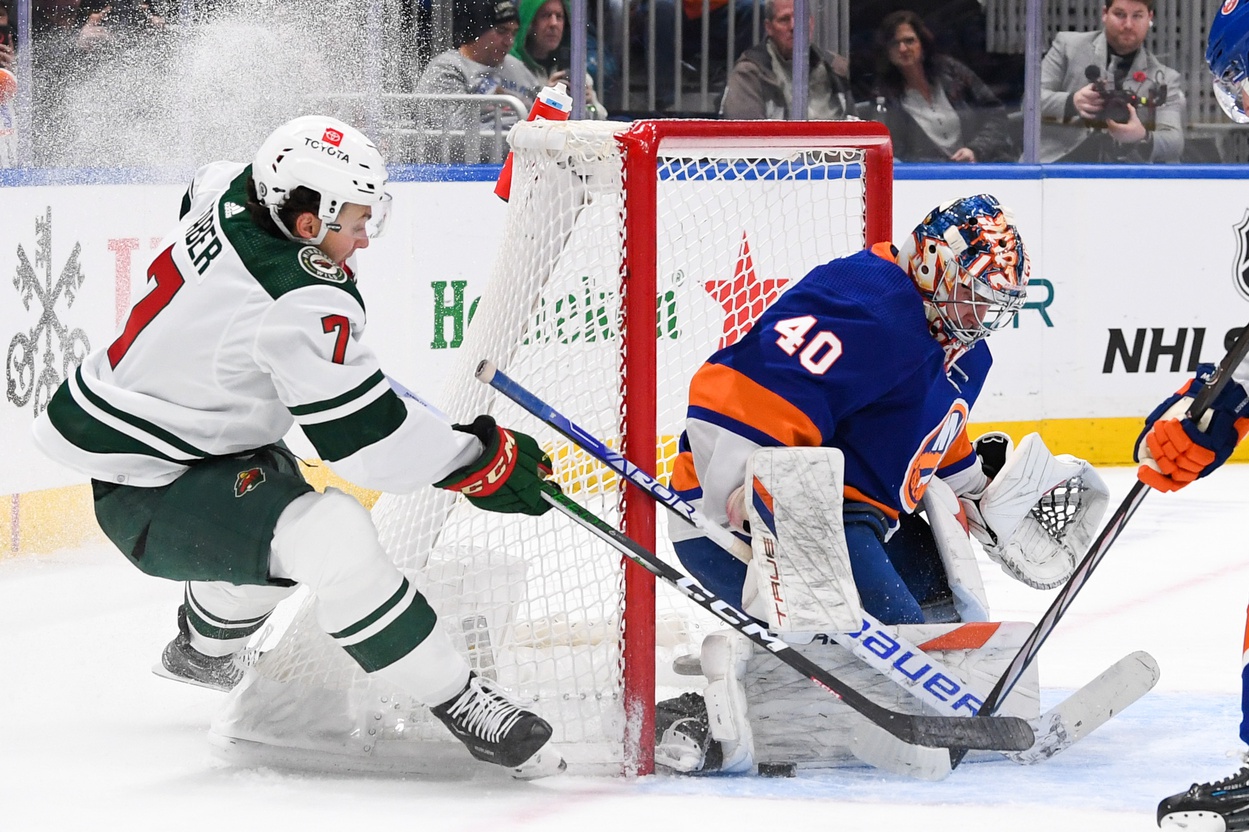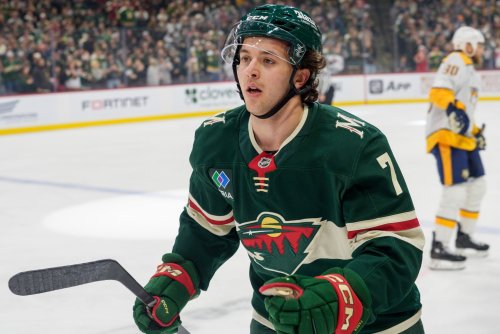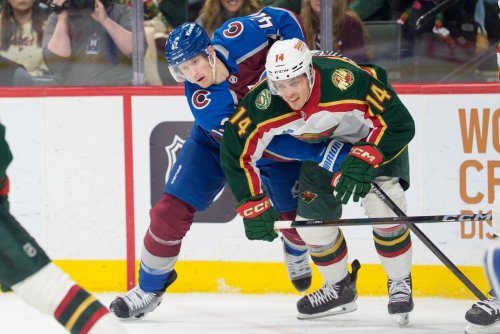
It took 15 games (21 if you count playoffs), but Brock Faber finally, amazingly, made what was probably the first real mistake of his career on Thursday night. Faber pinched to keep the puck in the offensive zone but lost the footrace to Vincent Trocheck, who started an odd-man rush the opposite way. Alexis Lafreniere buried his chance, and the Minnesota Wild saw a 1-1 tie turn into a 2-1 deficit two minutes into the third period.
The Wild never got a goal back, and the New York Rangers added two more. "It was just stupid, plain and simple," Faber said after the game.
It's the good teammate thing to do to take that kind of responsibility. But other than that pinch, Thursday was another example of the rookie defenseman going Sicko Mode. Faber registered an assist on Minnesota's only goal of the game while logging nearly 25 minutes of ice time, with 22 at even-strength alone. He was one of two defensemen to finish the night in positive territory for expected goals. Jonas Brodin was the other.
We've used this space before to talk about how incredible Faber's rise has been. He stepped up in the playoffs last year as a 20-year-old rookie and has carried the Wild's defense without Jared Spurgeon at 21. He had only two regular-season games of NHL experience entering both scenarios.
Now we're looking at the most mind-boggling thing of all: The possibility that this kid stepped in from the University of Minnesota to the NHL and instantly became the best defenseman in the league.
Here are the top five defensemen in terms of Standings Points Above Replacement (SPAR, an off-shoot of Wins Above Replacement, or WAR, from Evolving-Hockey):
1. Brock Faber, MIN, 1.9
2. Quinn Hughes, VAN, 1.8
3. Jakob Chychrun, OTT, 1.6
T-4. Erik Karlsson, PIT, 1.5
T-4. Morgan Rielly, TOR, 1.5
This is the part where we say it's a small sample size (13 games, 308 minutes), but the rest of the names pass the Connor McDavid Test. That is, the idea that if the best players in the NHL are at the top of a stat, that's a good indication that it's touching on something meaningful. Karlsson is the reigning Norris Trophy winner; Hughes's 21-points-in-13-games start has him as an early favorite for this year's Norris. And Chychrun and Reilly are top point-getters with top-10 Norris finishes in the past.
Not only is Faber on top of the heap among defensemen, but he's closing in on being the top player in the league early on. Elias Pettersson and Brandon Hagel are the only skaters ahead of Faber with 2.0 SPAR. Three players are tied for third alongside Faber with 1.9: Auston Matthews, Mikko Rantanen, and Jesper Bratt.
What's been the Wild's answer to a Matthews-type superstar this year? It's the 21-year-old kid wearing specs that, in another world, would make him a perfect candidate to sing lead for Say It Ain't 'Sota, the U of M's leading Weezer cover band.
What's making Faber stand out so much in this regard? Sure, his six points in 13 games are solid enough, good for third in the league among rookie defensemen. But that's not enough sheer scoring to put him up past Hughes, or Victor Hedman (17 points), or Cale Makar (15 points), etc.
Regardless, Faber gets the puck moving in the right direction, and goals just drop in when he's on the ice. The difference between the Wild with Faber and without is staggering. Minnesota has out-scored opponents 17-10 with Faber patrolling the ice at 5-on-5. That's 63.0% of the goal share, which ranks "just" 24th among the 153 defensemen who have had over 150 5-on-5 minutes.
The real magic is what you see what the Wild do without Faber. In the minutes where Faber rests, opponents out-score the Wild 23-16 at 5-on-5, meaning the Wild only score 41.0% of the goals. To review: Only the Vancouver Canucks and Boston Bruins are a better 5-on-5 team than Faber's Wild. When Faber's not there, Minnesota barely fends off the Chicago Blackhawks for 26th in the NHL.
You can also see the same sort of impact in Faber's expected goals. Only the Los Angeles Kings, Colorado Avalanche, and Pittsburgh Penguins control expected goals to a greater degree than the 56.4% share the Wild muster with Faber on the ice. Without him, that drops all the way to 40.6%. The 2-10-1 San Jose Sharks (39.1%) are the only team that's worse than Minnesota without Faber.
The Wild with Faber and without couldn't be more different teams!
You can give credit to Brodin, of course. Brodin has been Faber's most frequent defense partner and has been lights-out. Brodin's 1.4 SPAR puts him tied for 19th in the NHL and tied for sixth among defensemen. As with the other defensemen at the top of the WAR heap this early on, Faber is benefitting from absurd, unsustainable shooting luck. As a team, the Wild won't come close to shooting 15.5% at 5-on-5 with Faber on the ice for an entire season.
But to both of those caveats, Hockey Wilderness has but one question: Who cares? Brodin is a great player, but it isn't him who leads the NHL in defensive impact. He's (a close) second behind Faber. While Faber's shooting luck will surely drop, it doesn't change how good he is when he's on the ice or how poorly the Wild play whenever he takes a breather.
Will Faber keep a hold of his spot as the Best Defenseman in Hockey by the end of the year? It's a much safer prediction to say "No" than "Yes." But even if he doesn't, we can't take away the fact that we're an eighth of the way through his first NHL season, and we're having this conversation. If Faber's season keeps up anywhere near this level, he might well have the most impressive rookie season we've seen from anyone -- including Kirill Kaprizov -- in a Minnesota Wild sweater.
Think you could write a story like this? Hockey Wilderness wants you to develop your voice, find an audience, and we'll pay you to do it. Just fill out this form.
-
 1
1
-
 1
1








Recommended Comments
Join the conversation
You can post now and register later. If you have an account, sign in now to post with your account.
Note: Your post will require moderator approval before it will be visible.